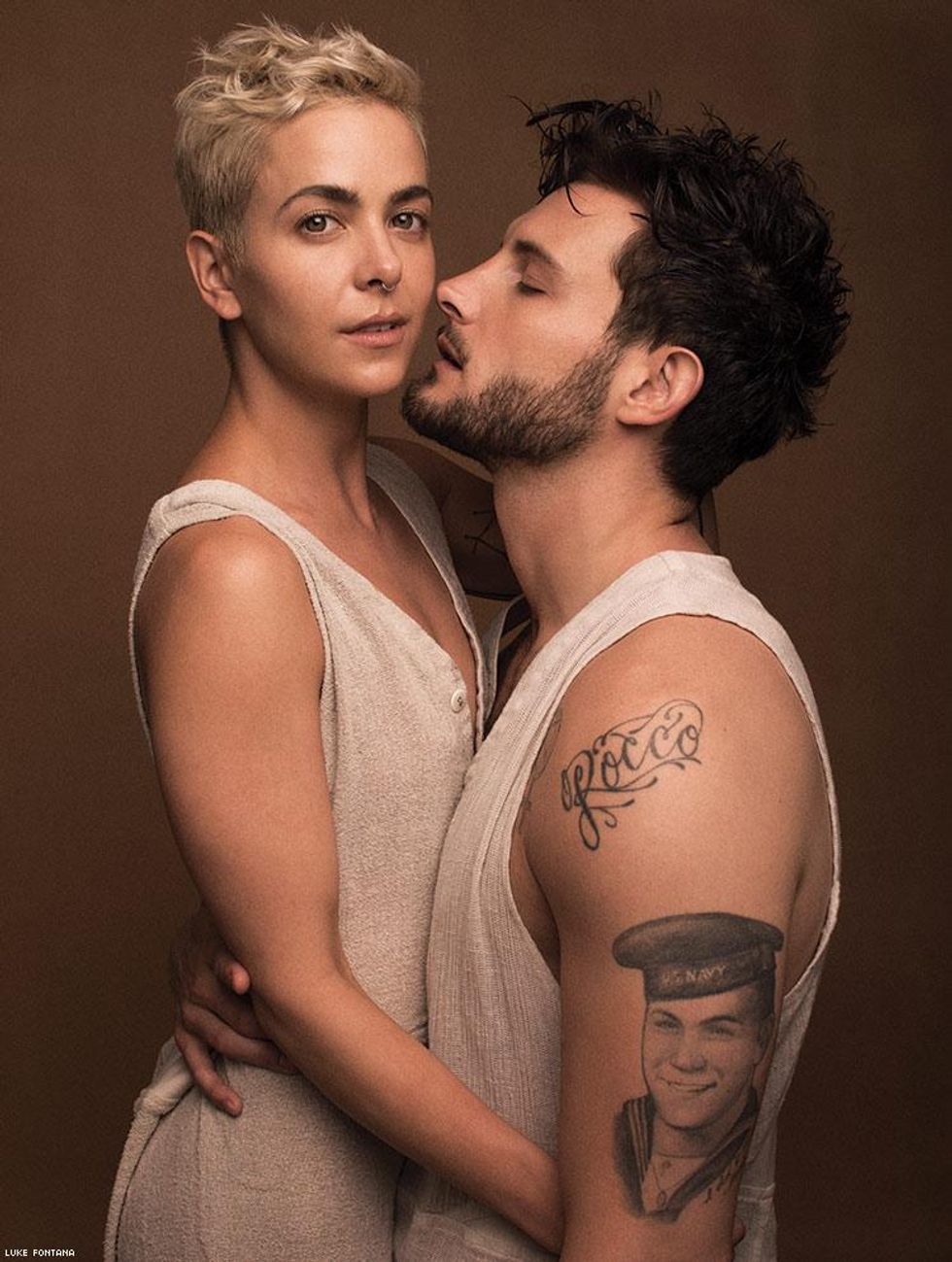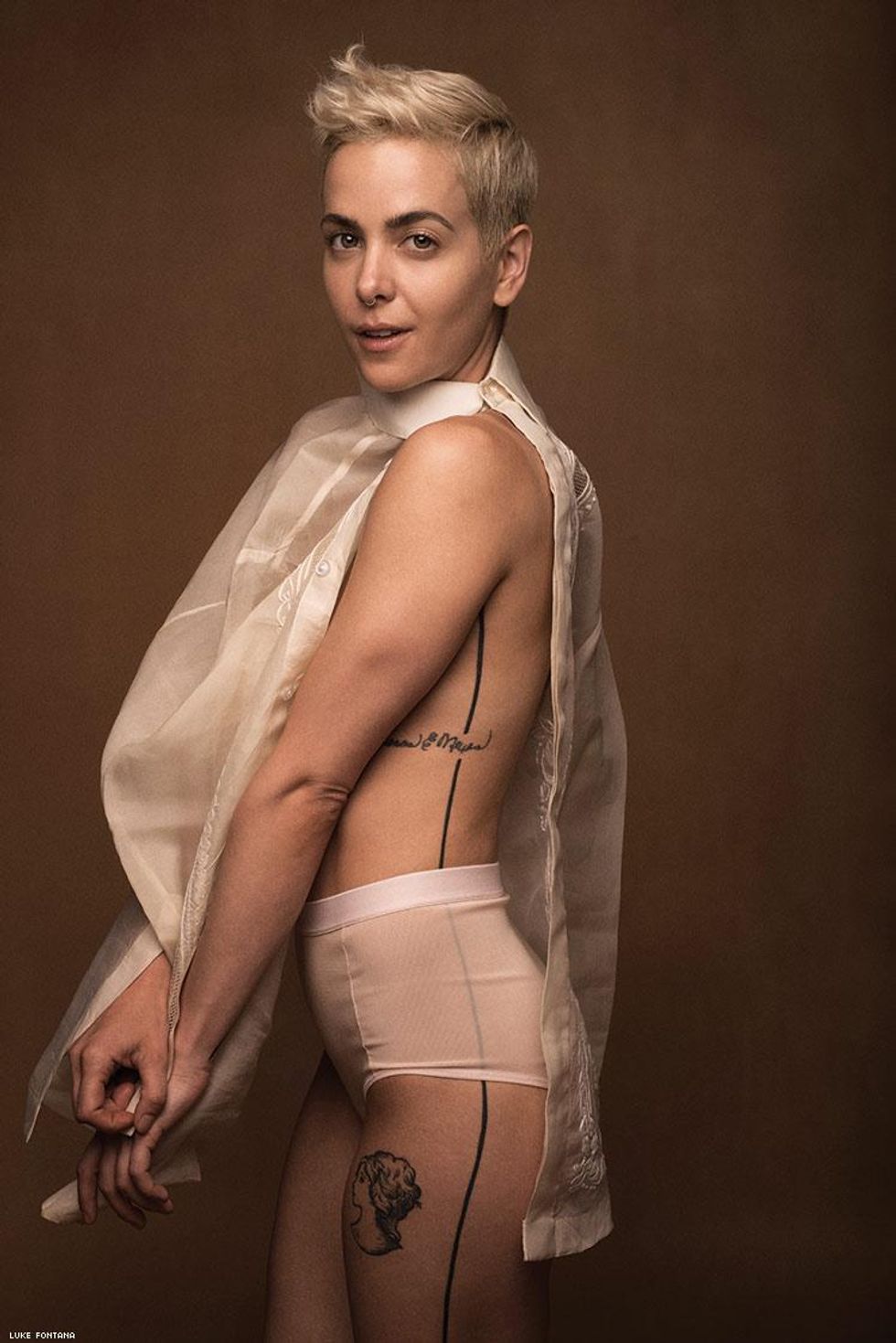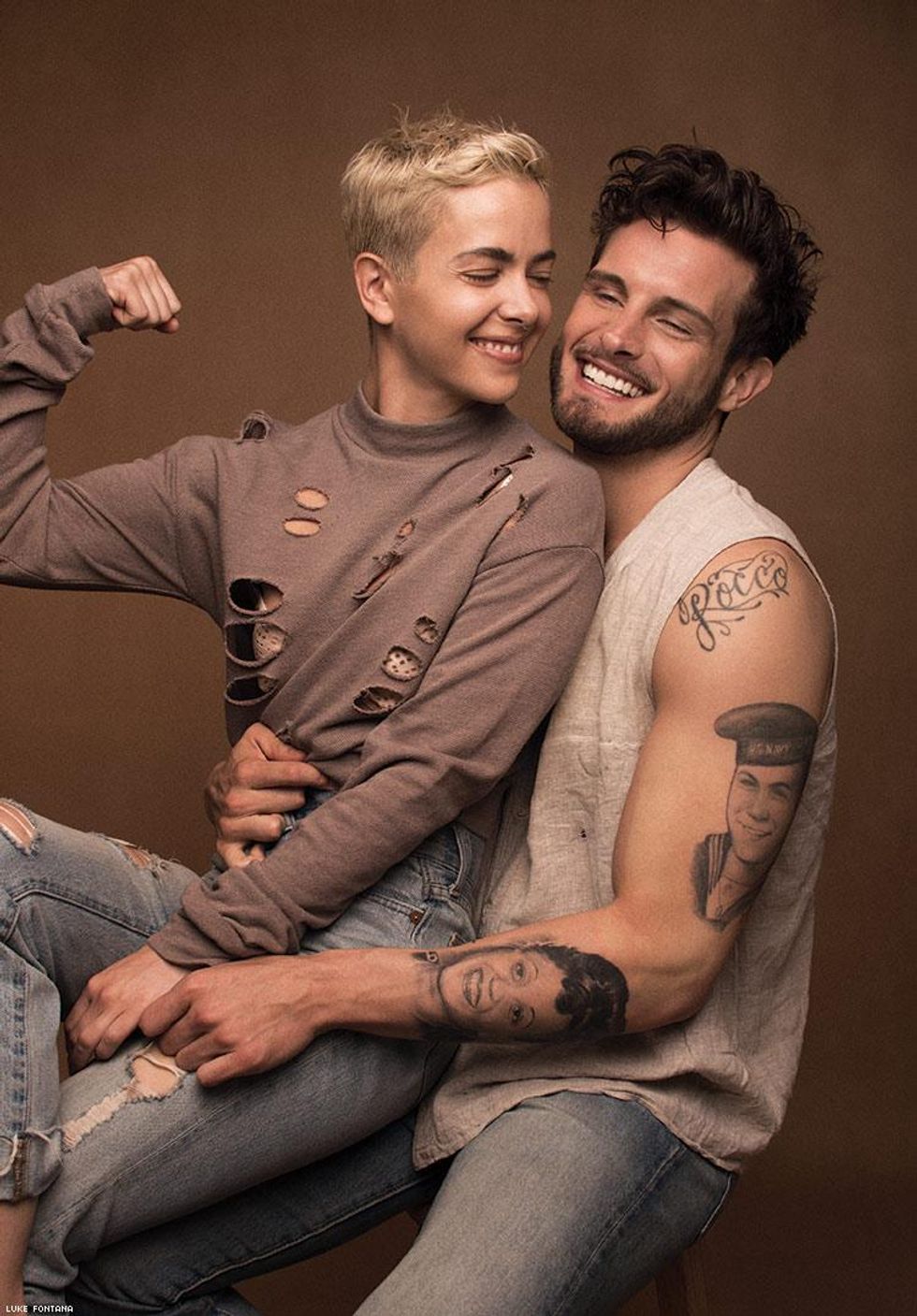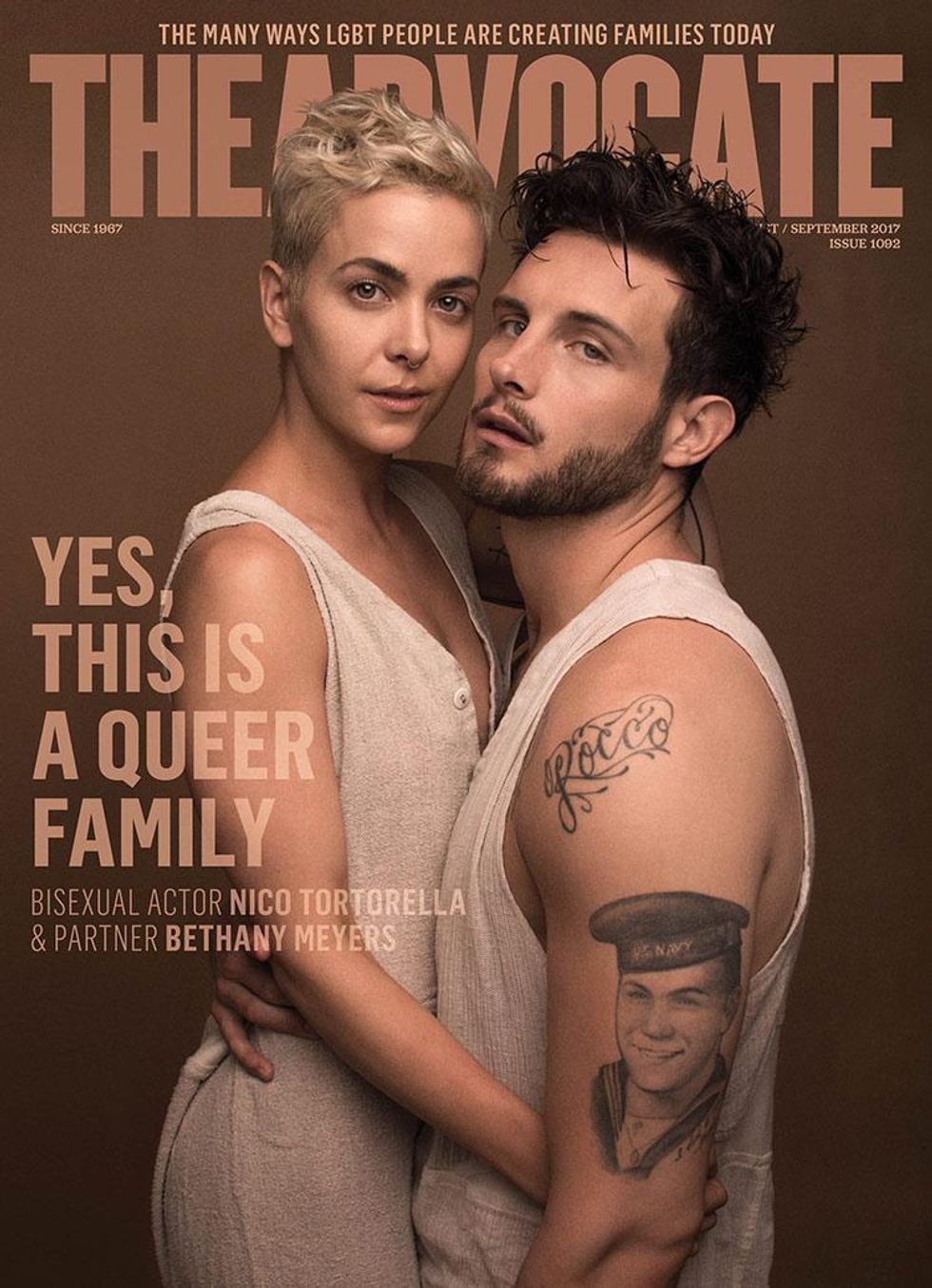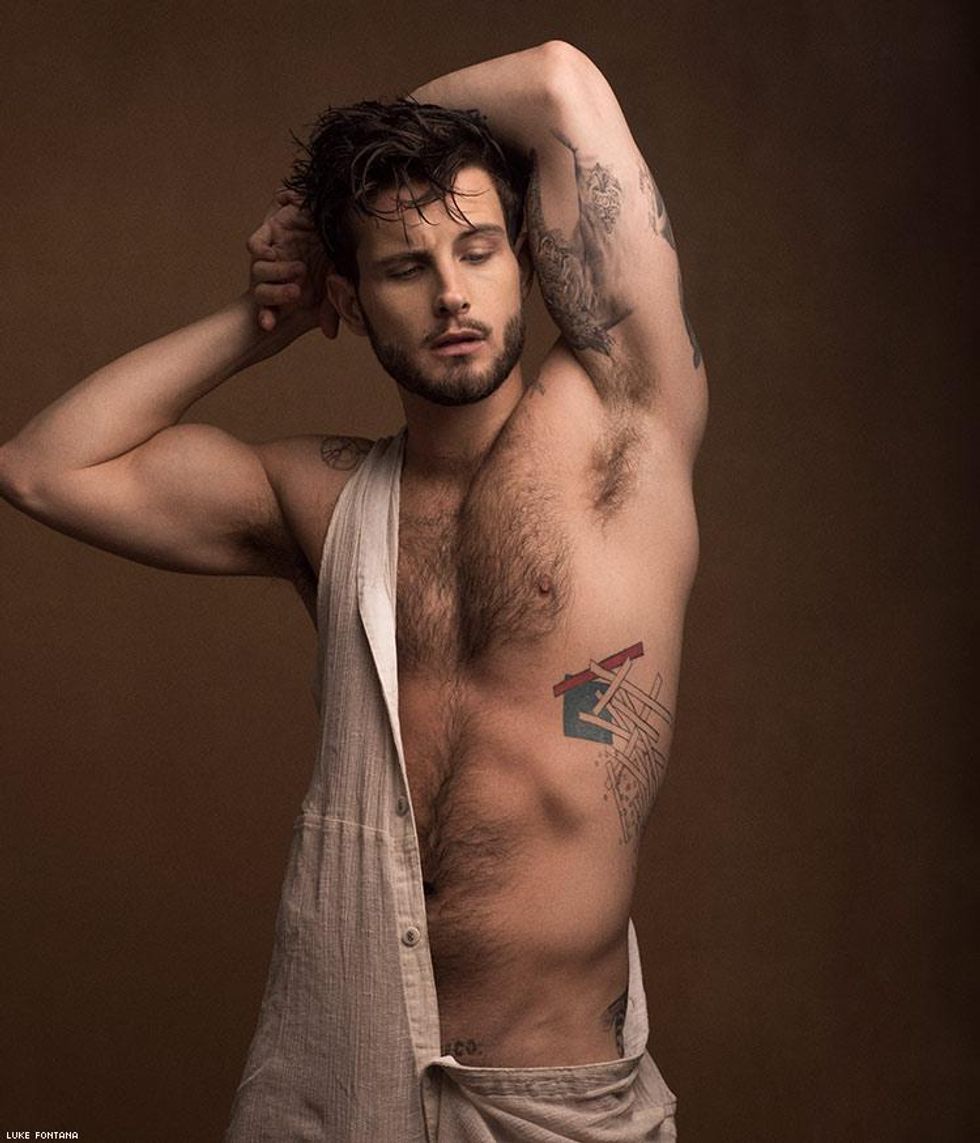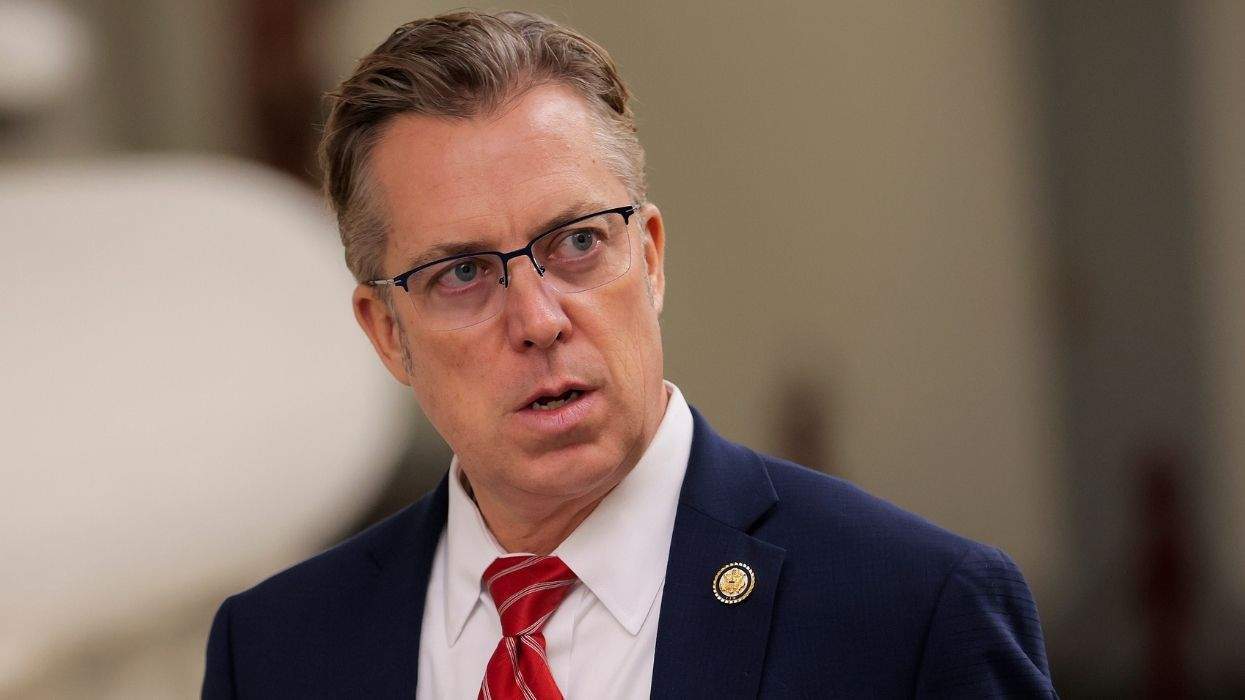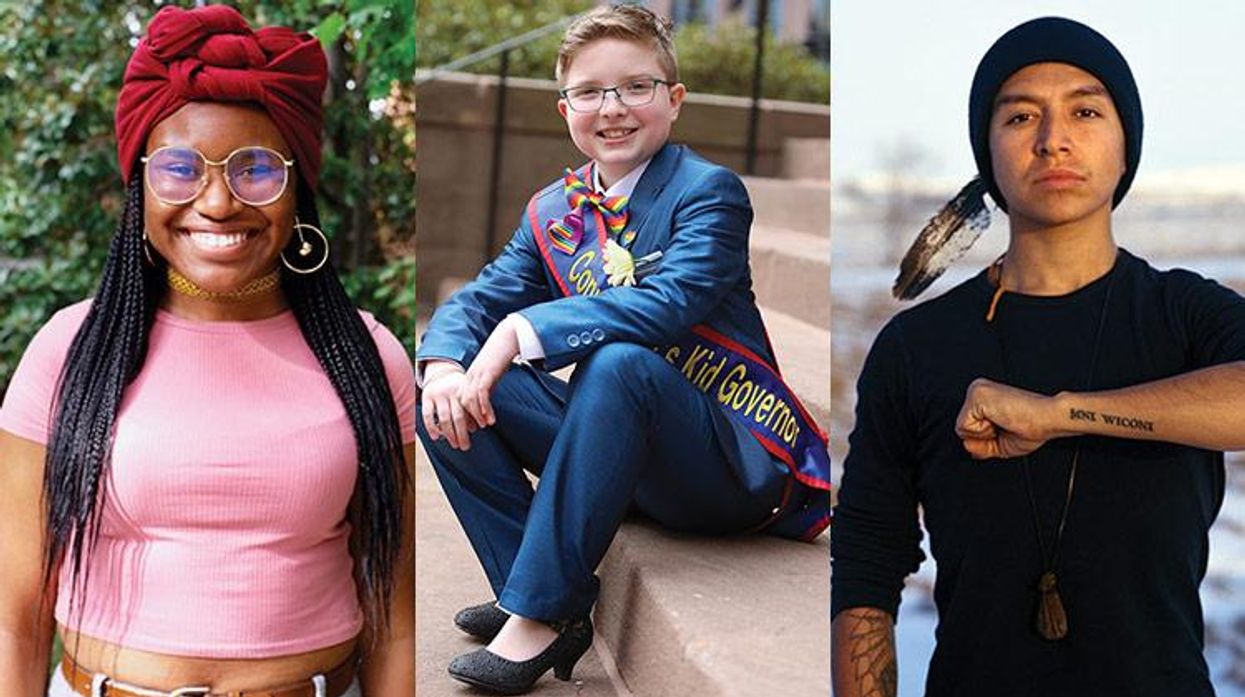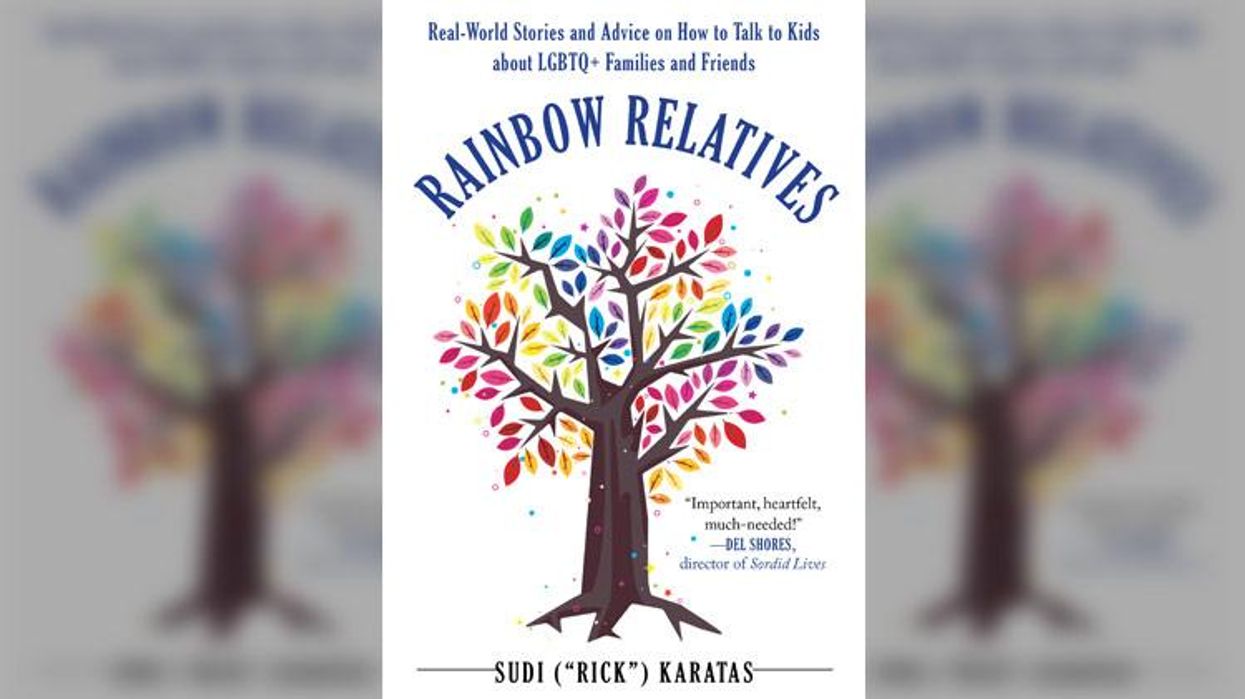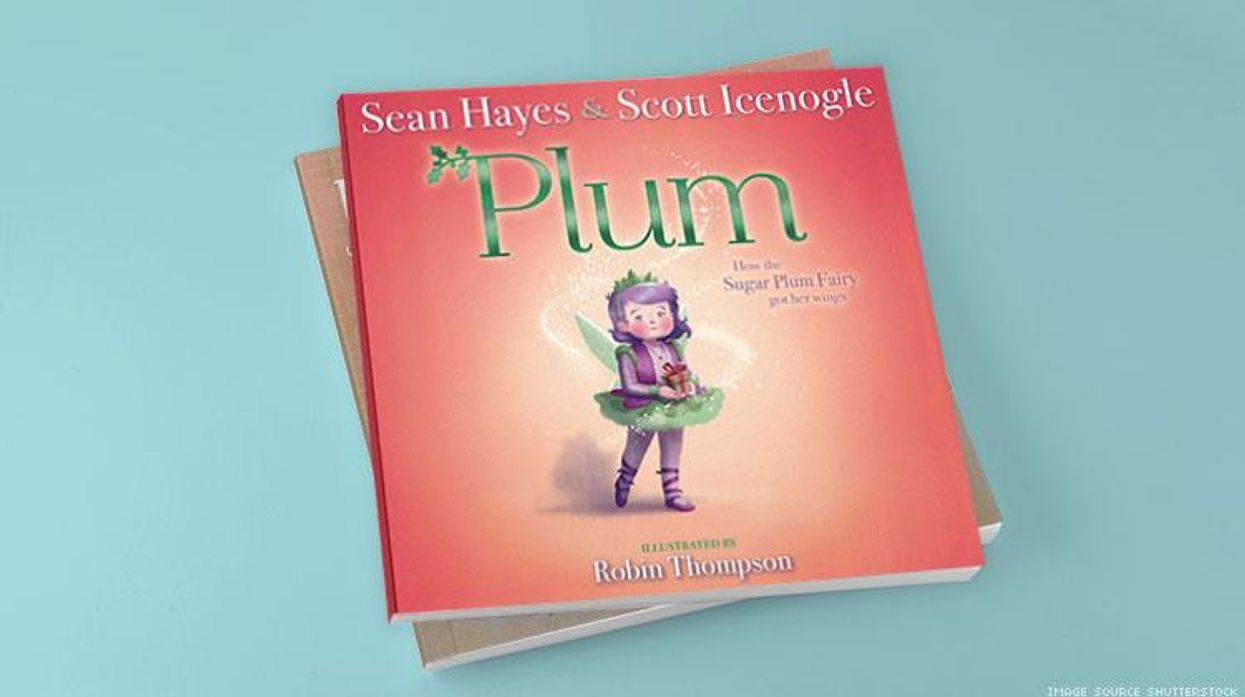* Article updated July 5 to clarify Meyers' prior relationships.
From the outside looking in, Nico Tortorella doesn't seem all that different from the straight cisgender character he plays on the sweetly addictive hit comedy Younger, which had its fourth-season premiere in June. From Sex and the City creator Darren Star, Younger began as a rom-com that follows a middle-aged woman (pretending to be a 20-something) who falls for a man in his 20s (Tortorella). TV Land has already renewed Younger for a fifth season, ensuring the show (and Tortorella's reign as one of TV's hottest men) lasts at least through 2018. And as the show has grown, so too has Tortorella's public openness.
There's no doubt Tortorella is leading man material -- tall, beefy, and what my Latino grandmother used to describe as "a very nice-looking white man." But once he starts talking about love and defying the gender binary, having sex with men, and how he "would give it all up, everything in my life, to be able to carry a child myself," you get the sense that this is a very different kind of Hollywood star.
Tortorella is also the guy behind the super popular podcast The Love Bomb, now in season 2, where each week he interviews one of the many, many people he loves. He's committed to shaking up norms around gender and sexuality. His decade-long polyamorous romantic partnership with Bethany Meyers, a fitness and lifestyle entrepreneur (who identifies as gay) is proof. It's a different kind of queer relationship, they admit, one that is thoroughly open and modern and enduring.
"There are those pockets of the world, in so many places, that 'gay' just doesn't exist, where there's no representation," Tortorella says, speaking of a gay man who escaped North Korea and discovered that gay people exist elsewhere. "And it's not that different than the representation that existed in Hollywood for the last hundred years. ... There's like one love story and it's between a white man and a white woman."
Tortorella -- who has been described as queer, bisexual, demisexual, and sexually fluid -- and Meyers, who usually dates women and identifies as gay -- are open with each other and the public about their romantic relationships with other people. They may defy labels, but Tortorella is absolutely fine if you want to give him one.
"I think for so long there's been like one quote-unquote normal way of life," he says. "And anybody that doesn't live in that structure needs to find a home of sorts. And I think labels are really important for kids, especially, [who] can't find their tribe where they are, and need to go find their people, their family. For that reason, I think labels are extremely important."
An increasingly staunch and vocal LGBT advocate, Tortorella may have initially gotten ribbed as a closet case, but there's no closet large enough to hide his emotional sophistication and unbridled sexuality. Just as the actor is very different from the dashing men he played in The Following and Odd Thomas (and the recent Menendez: Blood Brothers with Courtney Love), fitness guru and former pro cheerleader Meyers is far from a stereotypical cuckolded girlfriend of a rising star.
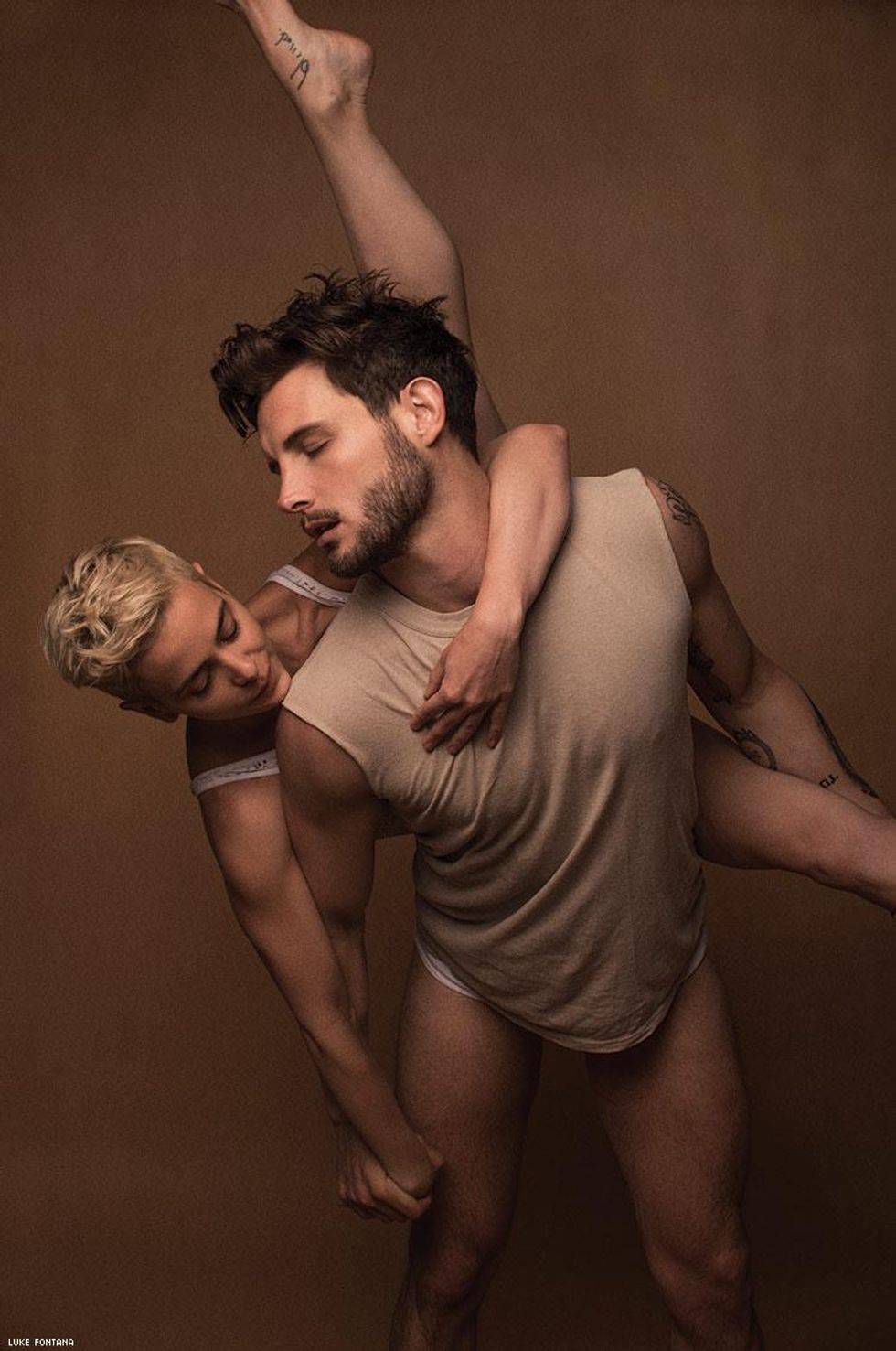
Tortorella and Meyers have been in love for over a decade, and their relationship seemingly has but one rule: to love each other. Boundaries are more or less nonexistent when it comes to having additional relationships outside their own. It's an idea founded on trust, and a notion that has yet to be fully understood across the cultural mind-set. Even they don't have a word to describe it, except for possibly being "witnesses" to each other.
It's this idea of love that inspired Tortorella's The Love Bomb, in which he explores love and the labels attached to it.
His first guest, and arguably the most important, was Meyers.
The first episode sparked a much-needed dialogue on what it means to be part of a polyamorous arrangement as well as the fluidity of love and sex.
"I think the way I use the word fluidity is like fluid in everything, fluid in train of thought; not this, not that; beyond definition. It doesn't always have to be one thing," he explains. "The one thing anybody can talk about, no matter race, religion, sexuality or gender, is love. Everyone has some sort of explanation, feeling, memory, backstory, or idea of love. The most magical thing about [The Love Bomb] has been no matter where you come from in the world, no matter who you're sleeping with, or who you're in love with, the last question I always ask is: 'What is love?' And for the most part, they all sound exactly the same."
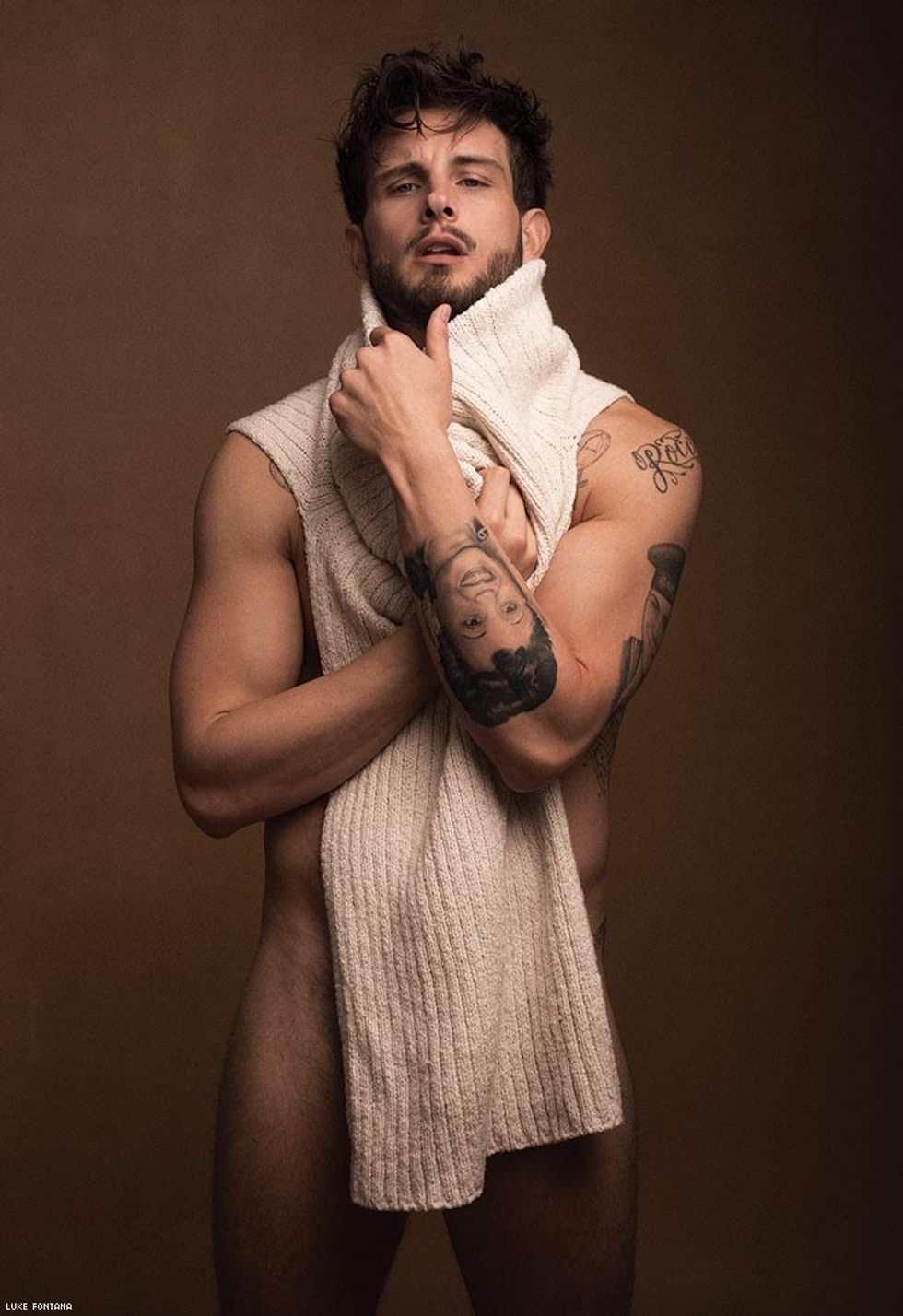
Polyamorous relationships have been around for centuries, yet it's only now that people are becoming less afraid to speak openly about them. Tortorella and Meyers's relationship is 11 years in the making and survives on what they refer to as a "day by day" pace, knowing that no matter what happens they're always going to be in each other's life. As Tortorella explains, this type of trust needs to be sealed before exploring such nonconventional avenues. It doesn't happen at the beginning: "It's not like you can jump on Tinder and look for a Nico or Bethany," he says.
Meyers also admits that due to a lack of examples of similar relationships, she had to teach herself how to navigate the rules. "I think we're raised with this idea that you're supposed to go and find 'the one,' especially women," she explains. "You're looking for your Prince Charming. You need to be proposed to. There's this one person you're searching to find, so the idea of finding a stability partner, and having other things on top of that, feels too messy. Then the dating apps make sense because now it's easier to find 'the one.' You can swipe back and forth. You can do a preliminary screening. It's [like] a business tool."
Though Tortorella and Meyers fight to live their truth beyond labels, they understand the world's necessity for words. Identifying as "more of a pansexual," Tortorella embraces calling himself bisexual to help battle bi erasure. "I can be emotionally, physically attracted to men. I can be emotionally, physically attracted to women. The 'B' in LGBTQ-plus has been fought for, for so long. I'm not going to be the person that's like, 'No, I need a 'P,' I need another letter!' I stand by people that have paved this way for somebody like me."
He says he originally thought "the term bisexual very much so lives in the binary of gender, and which I don't believe in." Most bi activists argue bisexual simply means attraction to your own and other genders.
"I believe in the spectrum, the full universe of gender and sexuality, and probably I fall more into the pansexual fluid terms which fall into the umbrella of bisexual in LGBTQ-plus," Tortorella says. "I think when I was first having this conversation, I didn't like the term bisexual because I think it was a little dated for this generation; people weren't using it. It kind of puts people into this box. [But] I respect the term bisexual. I use it because I respect it."
Meyers identifies as gay ("I know more women who call themselves gay than they call themselves lesbian," she admits), but also embraces the queer label. She says Tortorella is the only man she can imagine having a relationship with.
Love and sex, says Tortorella, are just two different things, though Meyers's family tends to disagree.
"That was the hardest thing about coming out to my family," Meyers recalls. "When I did it, I broke up with my girlfriend and then decided to come out. So because I wasn't in a relationship, it was like, 'I don't want to know what you're sleeping with.' They didn't talk to me for a long time, this is years in the making of things, but that's when I was like maybe I should have done this when I had a girlfriend, just to feel validated. It's so annoying that in your sexual preference that a relationship needs to make you feel validated."
Tortorella agrees, adding that nobody imagines straight couples, like Meyers's brother and sister-in-law, having sex; but if the person is queer, it's a different story.
"No one thinks about them fucking," he says. "But the second I tell them I'm dating a dude, the first thing he thinks about is my dick in his ass. It's disgusting. Like what the fuck is wrong with you that that's what you're thinking?"
"Whereas you're not like, 'Oh, you guys are getting married?'I bet he's going to stick his penis in her vagina," Meyers jokes.
Tortorella says, "We need to get our head out of that place. I really think that that's the biggest harm that we have done. Even the word 'sexuality.' What's your 'sexuality?' It shouldn't even be about sex. Sex is a by-product."
Despite Tortorella and Meyers's understanding that jealousy is part of being human, for them it's different. In fact, they told me they never get jealous when the other is dating someone of the same sex, like Tortorella's highly public relationship with Los Angeles-based hairstylist and Instagram star Kyle Krieger. It's only when they're dating someone of the opposite sex that jealousy intervenes, mainly because there's a chance of having a child, and they both desperately want to have a baby together.
"I really want to be pregnant," she says. She plans on freezing her eggs in the next few years.
Tortorella turns to her and adds, "I think if you're dating another woman and you talk about adopting a kid, or using [my semen] to have a kid, outside of us, yeah, I totally can get behind that. But the thought of you getting pregnant from another dude that you were dating, I don't know, it hurts in a different way."
When the first episode of The Love Bomb was recorded, Tortorella was in a relationship with another woman. He starts off the first episode with a poem he wrote: "This isn't selfish, it's free. I'm not gay. I'm not straight. I'm me." Ultimately, he admits, that relationship crumbled because there was no space for him and Meyers in it, though he thought (or hoped) there would be.
The love they have is evident in their charged glances, which have likely gone unchanged since the night they first met at a college party in Chicago. It was their confidence that drew each other at first. From there, they were on and off again for years, never actually breaking up officially (though he attempted a half-ass breakup when they started dating, it lasted only seconds).
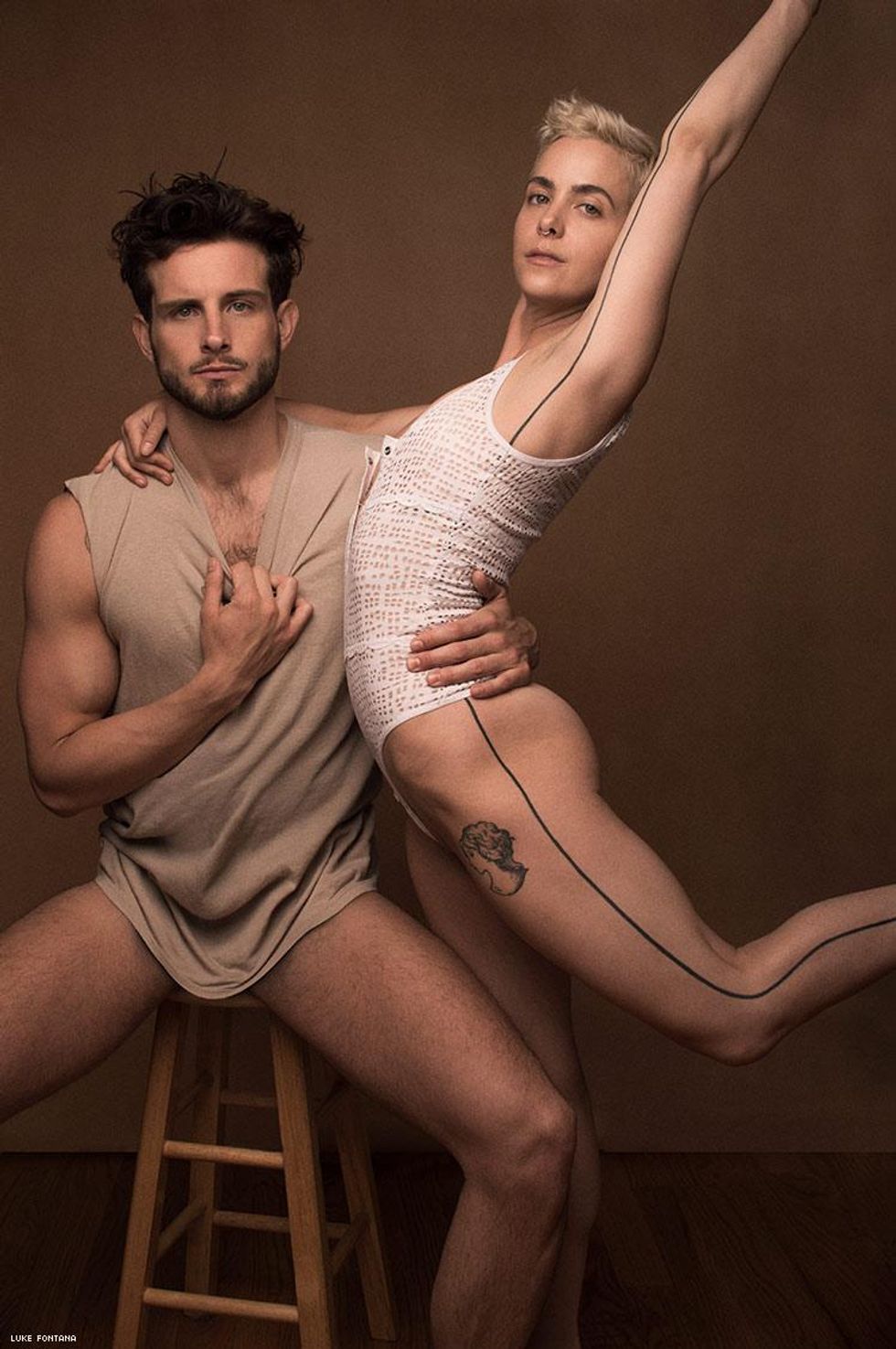
It was at the beginning of Tortorella and Meyers's relationship when they realized their love didn't need to be sanctioned with names or labels. Even when they lived together as a couple in Los Angeles, they never called each other "boyfriend" and "girlfriend." ("We're family," Tortorella says.) That was when, they both admit, they knew their relationship was something much more evolved, much more enlightened, and much more real. They credit meeting each other with finding their destinies in life. After all, it was Tortorella who introduced Meyers to yoga. Now she's one of the preeminent fitness influencers, known more for her gorgeously tattooed and butchy beautiful body than her relationship. Soon, she'll be launching a new fitness at-home app designed for women called Be.Come.
"Labels can be very frustrating," Meyers says. "They're evolving because people always make new words. Part of me wants to say we're going to move to a label-less society, but I don't know. Maybe [in the future] we'll just have more words."
Admittedly, Tortorella and Meyers are still inventing the constructs of their relationship, and labels are the least of their struggles. The duo don't live together. ("We live together great but we live better separately," he says.) The biggest hurdle, thus far, is other people.
"I tried to create a relationship along these lines with other people I've dated," she says. "We're still figuring it out."
"We're still figuring out the best way we can bring other people into our relationship," he agrees. "I think we're in the best place now [that] we've ever been, but we're definitely still on an amateur level." Then he urges, "If anybody is reading this and wants to give us some advice, and has been living this way for a long time, seriously, we're sponges! We're so down to hear stories because these stories aren't told often."
The truth is Tortorella and Meyers know their relationship is a threat to others. "[Past partners] didn't fully realize and understand who we are and what we mean to each other," Tortorella admits. "Like, 'OK, you have Bethany, [but] where do I fit into the puzzle?' 'Am I ever going to be as important as Bethany is?' And what's the answer to that? How do I best answer that question?"
"So many people have this idea that if you can love this, you cannot love this," she adds. "And I don't understand, because I do. I can have feelings for two people. There are different kinds of feelings, they fulfill different needs. I don't find it very realistic to think that I'm going to get everything I need out of Nico."
Despite the depth of their love, they share this notion: It's impossible to get everything they need -- nurturing, care, support, sex -- from the other person alone. For example, Meyers makes it clear Tortorella is the person she goes to when she needs a dose of encouragement, but not necessarily the person to whom she'll spill her guts when she needs a good venting session. She can find that elsewhere. And that's OK with him.
Their sexual needs exist along the same lines. Tortorella says he'd rather wait to have sex until the love blossoms in a relationship, while Meyers has no qualms about her love of casual sex. The best part is, despite their contrasting approaches, their goals are ultimately the same: to reach empowerment, fulfillment, and satisfaction. So what if they happen to take different avenues to get there?
"For me, sex is such an explosive exchange of energy between two people that if you're not connected, energetically, before you have sex, it can be damaging," Tortorella says about the rising hookup culture on apps like Grindr and Tinder. "If you open yourself up to somebody on that level it can be damaging to yourself and damaging for the other person if there isn't trust there. ... That being said, I totally understand people who want to have casual sex. I think what you have to do in this scenario is stay in your lane. Find people who want similar things -- physically, energetically, and emotionally. If some dude wants to fuck this girl but she wants to do something else, that can be an issue."
Meyers, who was raised in an ultra conservative Christian family, has a different opinion: "I think sex can be really fun and really empowering. I think for someone who's raised in a culture where sex is so bad and you can't orgasm... I find a lot of empowerment. And I do think there's a lot of responsibility to be up front and honest. I'm proud that as I've aged, I have been [honest]. I think women haven't gotten to feel super empowered with sex for a very long time."
In spite of what Tortorella's Instagram photos may suggest, he is quick to say that, at 29, he too is still trying to discover his own empowerment when it comes to sex.
"I don't think I've hit my sexual prime at all," he confirms. "As sacred as I look about sexuality, I'm so obsessed and passionate about learning more about sexuality. I've been talking about making The Love Bomb into a TV show and what it would be like. Right now, what it looks like is me going into the field and looking at all sorts of different types of sexuality and energy connections with people so I can get a better understanding. I don't think I know enough, I don't think I feel enough, and I don't think the world knows enough of it."
They're both still learning how to navigate this brave new world, they admit. But as a Hollywood leading man, one of the most valuable lessons Tortorella has learned was about his responsibility now that he has this place in history. He's one of the first actors who plays a straight leading man and love interest on TV to come out as bisexual. It was an epiphany that came two years ago after becoming sober.
"In the last 50 years ... for somebody like me, that plays more of the leading man role, there has been an unwritten set of rules that exist," he says, arguing that gay and bi actors have been limited in what TV producers have allowed them to do. "To be honest, I think when I got sober two and a half years ago, I took a look at my life, and what I represented in Hollywood. And what I wanted to represent outside of Hollywood. I [decided] there's no room to not be myself in all of this. If people are going to be having a conversation [about my sexuality] for whatever reason, if that's even a possibility, I'm going to be the one leading the conversation. If there were somebody when I was growing up talking like we're talking, things would've made so much more fucking sense."
He thinks kids today can eschew labels because LGBT leaders have been so successful at making a place in the world for them. He can talk about this for hours he says, but insists, "I think that if we all just saw each other for people and individuals and didn't try to give each other these [labels], the world would be such a more beautiful place. There would be so much more love if we just saw each other. As much as I love getting worked up in these conversations, imagine how much energy we'd save if we weren't having them, if it didn't exist, if we were all just people and we could love [who] we wanted and it wasn't an issue. Granted, is that some utopian idea? Yeah, sure, but what if? What if we allowed ourselves to just be 'me?'"

